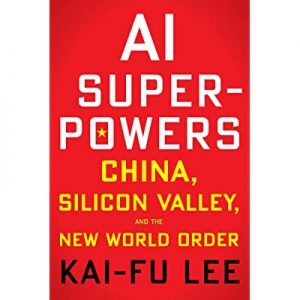
Kai-Fu Lee is a celebrated computer scientist, born in Taiwan, raised in America and now settled in Beijing. This book is divided into two major parts – 1st Book Synopsis and 2nd Analysis of the superpowers. Lee speaks of and concludes the differences of the approaches, opportunities, internet culture, prospects and the current wave of Artificial Intelligence. From Chapter 7 onwards, he shares his views on the development of these superpowers; while also discussing the major drawback of A.I. – emotional replications into machines. The book paints a fascinating picture of American and Chinese technological capabilities and their meaning for the ‘new world order.
According to Lee, even though America is running first in the race, he predicts that China’s rise is due soon and will be unchallenged. China has the most outstanding A.I. entrepreneurs, data supply and a government committed to forming structured policies to benefit the cause. According to Lee, the reason for America’s downfall is their shift from invention to implementation of the A.I. In this day and age, the development of A.I is far more necessary than implementing it. Implementing also entails the need to produce grows rather than the need to improve (quality and efficiency-wise). Lee also challenged the common misconception that Chinese businesses are “copy-cats” and lack innovative ideas. Lee explains how China has already achieved the coexistence of humans with A.I. He describes how China is building its infrastructure to accommodate unmanned A.I vehicles.
While the book discusses the variations between the USA and China, it focuses on the main issue – Humans Vs A.I. Lee states that the unequal distribution of power, due to the already existing power struggle between China and the U.S., shall increase threefold amongst poorer nations. This means that power will be in the hands of possibly one per cent of the people at the apex, multiplying the evils of poverty, inequality, unemployment, etc. This book also looks at the aspect of almost 40% per cent of jobs becoming extinct in the near future, thanks to A.I. A talk of basic universal income comes to give a basic income to feed their families and meet the necessities. Another question arises – will it restore the sense of identity and purpose of those people? Such an issue is difficult to answer.
Despite the onset of doom and gloom, the book empowers humans; optimistically putting all conspiracy theories (such as singularity predictions) to loss, as Lee states that before humans can reach that level, they will all be strong enough to conduct checks and balances; preventing the doomsday even at the cost of technological epiphany. While the book paints a pro-China image, Kai-Fu Lee has worked with Apple for years before returning to Beijing for work. The book explicitly shows no such devotion, rather disproves all the mainstream stereotypes that the tech industry holds for Chinese entrepreneurs, underestimating their capabilities. Lee also breaks certain general misconceptions of the tech industries, one of which is that people believe that revolutionary breakthroughs occur exponentially. Lee states that whatever the mid-level experts’ design, with more data, can reach its full potential. A phrase in the tech industry goes, “There is no data like more data.”
Lee also explains why China has more advantages than the USA. He states that for any country to succeed, it needs – Diligent Entrepreneurs, Lots of data. Government backing via safe and supportive policies, and well-trained and capable A.I Scientists
China is called the Saudi Arabia of data. It has already beaten the USA as the largest producer of digital data. The gap it has formed is had to leap, says Lee. Lee also states that China is so successful because it is a market-driven nation, having the world’s super apps, unbeatable but often ridiculed by the rest of the world. He also gives a profound and sound explanation for the copy-cat mentality (that exists but is dormant). Historically, the need to earn and feed the family toppled the need to invent and change the world. The Chinese are money-oriented for a reason, and maybe that is a fact many third-world nations, including India, can relate to even today.
In the latter half of the book, Lee leaves the talk of a potentially bipolar new world order instead of focusing on how A.I and humanity co-exist with one another. As mentioned earlier, the risks and their magnitude may be catastrophic. Universal Basic Income will become a sort of mercy killing to numb the pain and losses of the unemployed people. He suggests that a social investment system be formed, where the good deeds of people are rewarded. While A.I. may rule humankind; it will not take away the one particular thing gifted to humans – feeling love and care for fellow humans.
While no single factor may lead to such dramatic events to change and reshape the existing world order, many factors together might. Lee states that the role A.I. is playing in Military and security applications, along with economic might change things rapidly in the time to come. He urges investors to pick sides rationally as the USA is no longer in the lead, but the market remains U.S. centric.
This book opened incredible possibilities for our nation. It talks of the two-player A.I. Race, which, even though India might be lagging, will have a significant role. India has always been the bearer of righteousness and morality. While advancing technologically in such a short amount of time will be miraculous, India can focus on the negatives and call for legal regulations in the field of A.I. do not strictly have. China questioned the laws on A.I. at the UNSC is the first to do so. While non-state actors advocate campaigns to ban killer robots, there was acceptance of common humanitarian law against the development or use of Lethal Autonomous Weapons (LAWs). They were, however, not banned or put under heavy regulations.
India can either advocate the cause or join the race by exponentially developing its already growing I.T. industry. It would also secure the nation’s hard and soft power. Developing A.I. in the proper manner could mean that India will be able to improve public security, reduce poverty and develop ways to save lives. India would also need to adhere to the 4 points introduced by Lee to achieve such success. It would need to increase awareness and create an ecosystem that would train and develop A.I experts. Policies would have to be formed to increase and protect such productivity. While there is a rise in awareness, it needs to be harnessed with time. There are so many different platforms of A.I. which will take time to establish a network-centric approach. The process has started, but the transition is incomplete.
People of any field or specialisation can read this book because it draws the battle between nations, tech industries, and humanity with such colours that one can almost forget that it deals with some heavy topics. It is intriguing, mesmerising and thought-provoking. This book makes us realise how vital geopolitical aspects are and how we must pay attention to them, despite any ideological preference.















